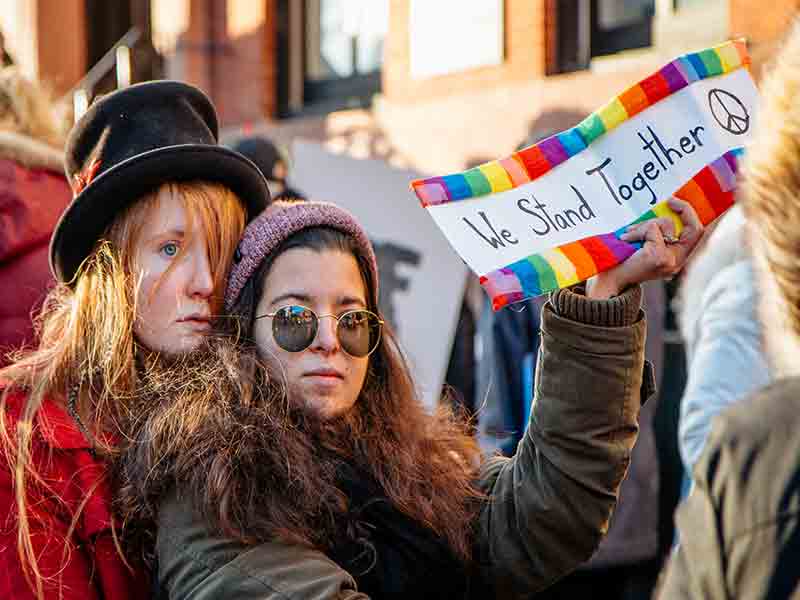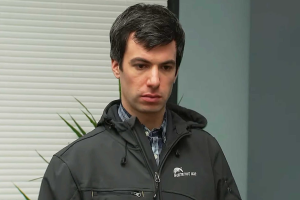I want to talk about what it’s like to be a Jew in North America right now.
For the past several decades, Jews – more specifically, white, Ashkenazi Jews – have largely felt safe on this continent. But recently, as we’ve watched angry, armed white supremacists marching in the streets with torches and swastika flags; heard about members of the Charlottesville Reform synagogue hurriedly moving the Torah scrolls from the shul in case the building was bombed or burned; learned about the surge of anti-Semitic vandalism and graffiti in York Region, Winnipeg, Boston and other cities, many of us feel shock and disbelief – not to mention fear, anger and immense vulnerability.
We know that open hatred and bigotry have been on the rise; most pointedly, targeting People of Colour and LGBTQ folks, women, Muslims and immigrants. We know that part of this is backlash against the growing strength and paradigm shifting work of movements like Standing Rock and Black Lives Matter. We’ve been watching, in recent months, as bigotry and discrimination have been given political legitimacy and social permission in the U.S.
‘Often, for stretches of time, it looks like we’re safe and doing well. It looks like we have all the privilege and protection’
In the face of this surge of hatred, however, it somehow still feels surprising that during the Aug. 12 rally in Charlottesville, VA, one of the main chants barked by white supremacist protestors out on the streets was “Jews will not replace us.”
I want to talk about what it’s like to be a Jew right now, so that we don’t become numb or isolated in fear, so that we are awake to the specific ways these events are hitting us. I want us to remember that this is not Germany in 1933. We have allies and friends in various communities. The world is different today than it was then. I also want us to have a better understanding of the ways that anti-Semitism functions differently than most other forms of oppression and bigotry. This way, we can see it more clearly and stand against it while concurrently working to eradicate all forms of hatred and oppression.
READ: NOT ALL ANTI-SEMITISM MERITS EQUAL OUTRAGE: SERIOUS INCIDENTS VS ANNOYANCES
Anti-Semitism sets Jews up in the role of middle agents, rather than at the bottom of the socio-economic ladder. When the economy is good, when it benefits the larger society, Jews are given access to opportunities and resources. There have been times in history that Jews have been welcomed in the courts of sultans and in centres of commerce, actively brought into countries as new immigrants and absorbed into the larger culture.
Often, for stretches of time, it looks like we are safe and doing well. It looks like we have all the privilege and protection of unhindered upward mobility and success, of social acceptance and inclusion.
But that position is precarious, provisional. It comes at a cost. It sets us up to be the target of anger, resentment and violence, blamed for the decisions of the wealthiest and most powerful. When people want an easy solution and an easy target for complex problems, the Jews are turned against and scapegoated. Rather than address the problems of an economy falling apart and a fast-changing society, people blame Jews, leaving those in the upper echelons of power protected. The Jews then bear the brunt of anger from a populace that feels frustrated, disenfranchised and powerless. This cycle has been repeated again and again across societies and over centuries.
‘some part of us is always anxiously waiting for the next eruption of anti-Semitism, ready to run or hunker down or come out swinging’
When anti-Semitism is at an ebb, people tend to think it no longer exists. As a consequence, anti-Semitism is left off the agendas of social justice movements. Further, when anti-Semitism does occur, Jews and non-Jews alike are often in denial about what it is. They may excuse, justify or dismiss it as insignificant in comparison to racism or homophobia.
The thing is, anti-Semitism doesn’t ever actually go away. It goes underground and simmers, until it is once again deemed useful, until there is an opening for it to explode, as we just saw in Charlottesville.
Because of these dynamics, for many Jews, even during calm periods in history, some part of us is always anxiously awaiting the next eruption of anti-Semitism, ready to run or hunker down or come out swinging. This limits our ability to thrive, to be relaxed and joyous, and to believe that we truly belong in the society.
Because of these dynamics, it’s been hard for many Jews to build strong ally relationships with other groups. It’s been hard for us to trust that the non-Jews in our lives will be there for us, will stand up and fight for us. Mostly, we wouldn’t dream of asking, because we’re embarrassed or scared, or we don’t quite believe we can count on them.
Because of these dynamics, many non-Jews lose sight of how important it is for us to know that they’re with us as loving, brave partners, that they’re committed to ending anti-Semitism.
Throughout our history, friends and neighbours have turned on us. The ever-looming threat of anti-Semitism and its traumatic memory often make Jews inclined to seek safety in power and wealth, when available. It can make it frightening for us to be critical of those who afford us some protection – however tenuous – or to look honestly at our participation in oppressing others.
Now is an important time to talk about these dynamics with our fellow Jews and with non-Jews. Now is a key moment to respond differently to these historic patterns. We have to do more than merely lead careful lives. With clear insight and brave vision, we must deepen our relationships with other targeted groups and reinvigorate our shared commitments to eradicating anti-Semitism, racism, classism, ablism and LGBTQ oppression.
In the diversity of our struggles and in our shared humanity, we must live within the truth that we are in this together.







